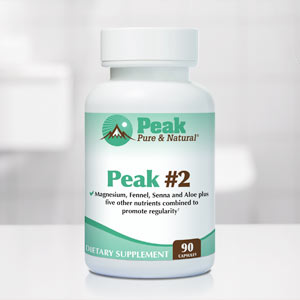Get Easy Health Digest™ in your inbox and don’t miss a thing when you subscribe today. Plus, get the free bonus report, Mother Nature’s Tips, Tricks and Remedies for Cholesterol, Blood Pressure & Blood Sugar as my way of saying welcome to the community!
Fiber: The one dietary change that could make the biggest difference

If you could only stick to one health tip, what would it be?
I’m only asking because a chief complaint I hear from people who have a hard time leading a healthy lifestyle is that there’s just too much to remember, especially when it comes to eating healthfully.
I agree. There’s conflicting information about eating carbs, protein and even fats. On top of that, there’s always a new diet to follow. It can certainly be overwhelming!
So, I understand where people are coming from when they say eating healthy is too hard. But my advice is simple: stick to the fundamentals… and you can’t get more fundamental than fiber.
And that’s my advice. If you want to take baby steps towards greater health, I’d recommend you eat more fiber.
You could start with — at the risk of sounding cliché — an apple a day. You could consider adding fiber-rich ingredients, like broccoli, to your salads. Or enjoy fibrous soups like lentil or black bean. The possibilities are endless.
And believe me, it would be well worth it. Practically none of us, and studies back me up on this, gets enough fiber — especially us Americans. And just look at what happens — and doesn’t happen — when you eat more fiber…
- 70 to 80 percent of your immune system is in your gut. Cultivating a healthy balance of intestinal flora truly is the first step to achieving optimum health and avoiding serious diseases. Fiber from carbohydrates is what feeds gut bacteria in humans — so a stomach that’s full of fiber is full of the good guys that feed on it. This type of dietary fiber is also known as prebiotics.
- Want to grow old without the burden of disability, depression, dementia, heart disease, stroke, cancer or other chronic diseases? Fiber can make this happen. Australian researchers found that people with the greatest fiber intake had close to an 80 percent higher chance of living a longer, healthier life than those who weren’t consuming as much fiber.
- Diabetes is a symptomatic disease. You get it because of a more serious underlying condition… insulin dysfunction. But an eight-country study supports what many researchers have been saying for years… making dietary fiber a primary facet of the diabetes conversation can offer significant health dividends. Fiber’s benefits start to most effectively begin kicking in when you consume more than 26 grams a day. When you consider that an apple has 4 grams of fiber, a cup of raspberries has 8 and a cup of instant oatmeal has 4 grams, you can see that getting that much fiber a day shouldn’t be too difficult.
- If you’re trying to lose excess fat but can’t quite overcome hunger and cravings, you can help your body by eating the right kind of fiber. That would be insulin fibers, which are fermentable by the flora in your gut. The fermentation is what produces the acetate to suppress appetite. Natural sources of inulin fiber are chicory root, the allium vegetables (onions, garlic), asparagus, the Jerusalem artichoke and bananas. Yes, bananas seemingly have a bit of sugar in them, but their inulin makes them very slow to digest, which means bananas along with these other vegetables have very little effect on blood sugar.
- Does your diet tend to be higher in saturated fats? If it is, chances are you don’t sleep well. Saturated fats act like energy in the body — high energy — and that increased energy, even though you may feel sleepy, makes for a poor night’s sleep. If you get the right balance of fiber — and fat — you’ll be sleeping like a baby and helping your body ward off a host of chronic diseases, including heart disease.
- See results fast. Rural people in South Africa hardly ever have colon cancer or intestinal polyps, growths that often turn into cancer. In a two-week experiment, scientists persuaded 20 Americans to eat a fiber-rich diet similar to the typical South African diet. After two weeks, the experiment showed that the Americans’ cancer risk had already dropped. The Americans had more butyrate in their colons, a substance produced by intestinal bacteria that helps fight cancer.
- The major cause of constipation is insufficient dietary fiber, and when toxic wastes sit in your colon for a prolonged time, they are more likely to find their way back into the bloodstream. That can lead to leaky gut syndrome and trigger systemic autoimmune inflammation — the jumping board for myriad diseases.
- A high fiber diet may relieve gout. A study published in the Journal of Leukocyte Biology shows that a high fiber diet curtails gout-related inflammation. And if you’ve ever experienced the pain of gout, you know it’s no fun.
Fiber is a vital piece of the wellness puzzle. Fiber provides bulk, suppresses appetite, binds with cholesterol, lowers blood sugar and speeds removal of toxic wastes from the bowels, thereby reducing the risk of constipation, high blood sugar, hemorrhoids, diabetes, cholesterol, heart disease and some cancers.
Adding more fiber to your diet can be a treat. Think about your favorite berries and enjoy them with breakfast or anytime. Aim for at least 25 g of fiber a day. For an extensive list of high fiber foods, check out this post on the “More Fiber” diet.
When you begin to increase your fiber intake, do it gradually… but do it. Your digestive system may need time to get used to the extra fiber, but in the long run, it’s one of the healthiest things you can do for yourself.
Editor’s note: Are you feeling unusually tired? You may think this is normal aging, but the problem could be your master hormone. When it’s not working, your risk of age-related diseases skyrockets. To reset what many call “the trigger for all disease” and live better, longer, click here to discover The Insulin Factor: How to Repair Your Body’s Master Controller and Conquer Chronic Disease!














